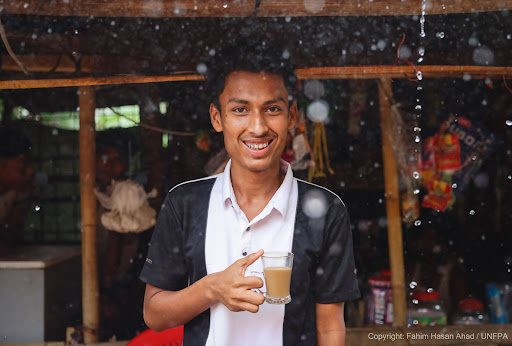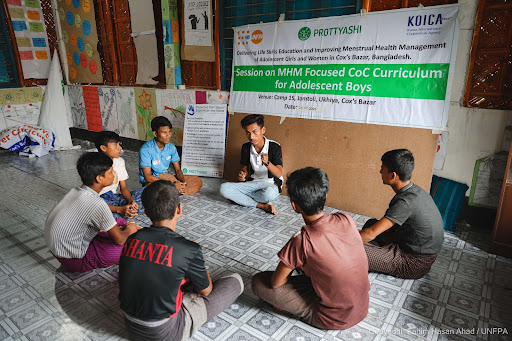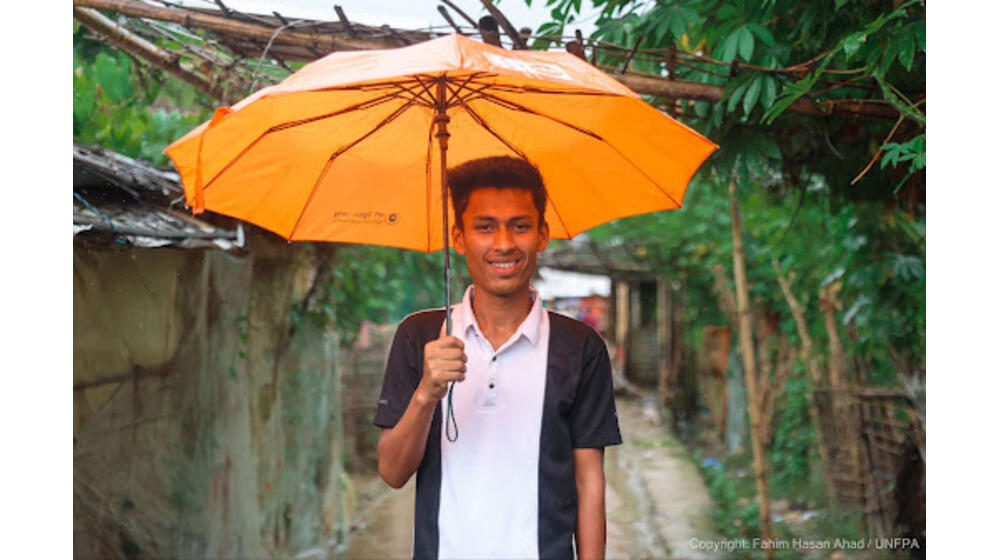In the heart of the world's largest Rohingya Refugee Camp in Cox's Bazar, a 20-year-old named Aslam Shah stands as a beacon of change, igniting a spark of transformation through his unwavering dedication and newfound knowledge. As a volunteer for the UNFPA-funded Adolescent and Youth (A&Y) Center, Aslam's journey began as a Champion of Change (COC) Graduate. His mission? To serve as a catalyst for positive change in his community, a role he has embraced with unwavering determination.

The Champions of Change for Gender Equality and Girls’ Rights initiative seeks to rewrite the narrative of gender inequality through youth involvement. It empowers girls while encouraging boys like Aslam to challenge the toxic masculinity that perpetuates discrimination. Guided by the vision of this initiative, Aslam embraced the opportunity to challenge harmful stereotypes and biases that had perpetuated discrimination and inequality within the vulnerable Rohingya community.
Soon, Aslam delved into a curriculum that went far beyond traditional boundaries. There, he learned about Gender Equality, Sexual and Reproductive Health rights for both boys and girls, tackled subjects like Child Marriage, shattered Social Myths and Taboos surrounding Sexuality, and delved into important issues such as Male Pride and Menstrual Health. Through this education, Champions of Change was nurturing a groundswell of change agents, molding young men like Aslam into advocates for redefining healthy masculinity and driving gender equality.

Now, a proud volunteer, Aslam is a force of transformation within his community. He strides from door to door, engaging adolescent boys and kindling curiosity within them to step into A&Y Centers. He passionately spreads awareness at tea stalls and gatherings, filling the air with conversations that challenge misconceptions. His dedication extends beyond the initial sessions; he ensures that no one misses out on this transformative education, offering backup sessions and sharing his insights with other youths in his community. As Aslam reflects upon the past, he recalls the deeply ingrained myths and taboos that once stifled his community's perception of girls' sexual health.
"People believed that if a girl experienced her first menstruation in a neighbor's home, misfortune would befall their family," Aslam recounted.
Another myth dictated that girls should avoid nutritious food during menstruation for fear of increased bleeding. But Aslam's spirit is one of change. He has initiated conversations that are breaking these age-old taboos. Through his persistence, girls now participate freely in outdoor activities. His own family, too, has undergone a remarkable transformation. Aslam, with four sisters by his side, has spurred a shift within his household, breaking barriers that once stood tall. No longer does his sister bear the burden of his unfinished tasks; now, they stand as equals, supporting one another with respect and care, even during their menstruation.
"In our block," Aslam proudly proclaims, "you won't find a single adolescent who isn't aware of Menstrual Health, Gender Equity, and Sexual Reproductive Health."
His dreams extend beyond his block, envisioning a future where gender-based violence is but a distant memory, and equality reigns supreme.

Filled with conviction, Aslam envisions a brighter future, a community liberated from the clutches of outdated taboos and myths. He stands as living proof that education, empathy, and action can kindle change, that a single individual armed with knowledge can catalyze a movement that transcends generations. As his story intertwines with International Youth Day, Aslam's journey resonates as a testament to the immense power of the youth, an embodiment of the theme "Green Skills for Youth: Towards a Sustainable World," where change blooms and transforms lives, one heart at a time.


